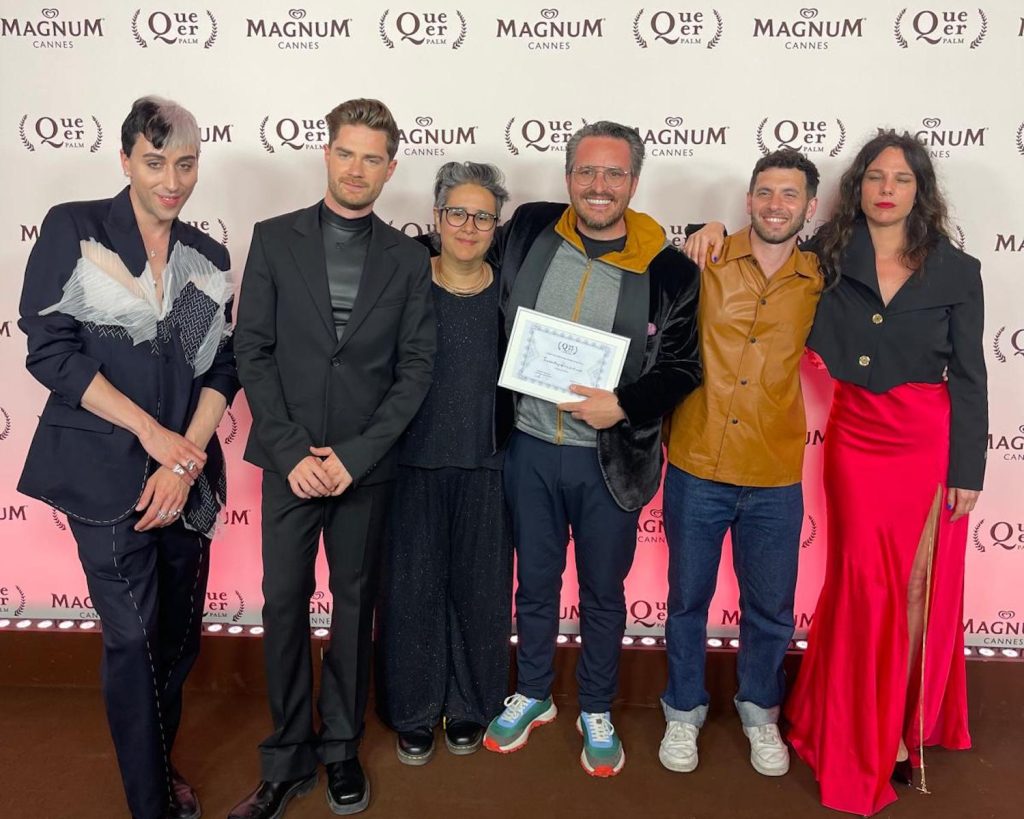:quality(80)/business-review.eu/wp-content/uploads/2024/05/Screenshot-2024-05-27-at-12.46.46.png)
With a consistent presence this year at Cannes Film Festival, Romania took Queer Palm Award with “Three Kilometers to the End of the World / Trei kilometri până la capătul lumii,” directed by Emanuel Parvu, as well as a series of positive reviews in the international press for this movie and also Nasty, the documentary about the tennis player Ilie Nastase.
Queer Palm Award for Three Kilometers to the End of the World
The competition jury this year, which also included films by Jacques Audiard, Marcelo Caetano, and Karim Aïnouz, was composed of: Lukas Dhont (director), Paloma (winner of Drag Race France), Jad Salfiti (journalist), Juliana Rojas (filmmaker, editor), Sophie Letourneur (director, actress).
The award was handed to director Emanuel Pârvu by Lukas Dhont, who also read the jury’s motivation: “A harsh and precious deconstruction of a system of violence. Its perspective slowly reveals the patriarchal world in which our characters were raised, where the space to fully exist is made impossible by deeply rooted ideologies. […] In this mesmerizing film, people seem to be held by strings that pull them away from the light, until some of them begin to break free.” Miruna Berescu, the film’s co-screenwriter and producer, was also present at the ceremony.
Since its establishment in 2010, the Cannes Film Festival Queer Palm has rewarded memorable films that reflect the diversity and importance of the themes addressed by this award. Previous Queer Palm laureate films have contributed to promoting the LGBTQ+ cause in cinema, including titles such as: “Monster” (dir. Kore Eda Hirokazu), “Girl” (dir. Lukas Dhont), “Portrait of a Lady on Fire” (dir. Céline Sciamma), “120 BPM (Beats per Minute)” (dir. Robin Campillo), “Carol” (dir. Todd Haynes), “Pride” (dir. Matthew Warchus), and “Laurence Anyways” (dir. Xavier Dolan).
Good international reviews for Three Kilometers to the End of the World and Nasty
For “Three Kilometers to the End of the World”, The Guardian noted that the movie is “A tough, sinewy drama about a whole community that wants to look away from others’ differences and its own culpability,” while Variety considered that ““Three Kilometers to the End of the World” follows faithfully in that national tradition — there’s no mistaking the cinematic heritage of its patient long takes and preference for static, body-slicing camera placement, nor its preoccupation with the corrupt inner workings of local authorities. But for all its cool, compelling proficiency, there’s little about the film that feels idiosyncratic, either stylistically or in its surface-level human portraiture. A Cannes Competition berth will doubtless raise Pârvu’s auteur profile, but feels a touch premature.”

For “Nasty”, Thierry Frémaux, the director of the Cannes Festival, introduced the film with enthusiasm: “Romania is a great country for cinema, just as it is for sports. The two, film and sports, go very well together. The memory of sports is a collective memory, which lives through film and is thus passed down through generations. Those who know Ilie Năstase know that the title of the documentary, ‘Nasty,’ is very fitting. This athlete was the first number 1 in the history of the ATP ranking, and I want to greet ATP director Andrea Gaudenzi, who is with us tonight. The film we are about to see tells a part of the history of tennis, but it also captures an extraordinary, different era in which Ilie Năstase was the main actor.”

After the special screening, The Guardian noted that “One of the paradoxes of Năstase is that, off the court, he appeared to be highly popular among his fellow professionals, with enthusiastic endorsements in the film from figures including Billie Jean King, Björn Borg and Jimmy Connors,” while Screen Daily mentions “Nastase’s talent was always undeniable. Archive footage, whether in colour or black-and-white and set to a propulsive score by Marius Leftărache, showcases his balletic athleticism.”
Six films from Cannes coming to the Romanian cinemas
Independenta Film brings six of the most anticipated films that premiered at the Cannes Film Festival to Romanian cinemas: “Emilia Perez” (directed by Jacques Audiard), which won both the Jury Prize and the Best Actress Award given to the entire female cast of the film, “The Substance” (directed by Coralie Fargeat), winner of the Screenplay Award, “Megalopolis” (directed by Francis Ford Coppola), “Parthenope” (directed by Paolo Sorrentino), “Marcello Mio” (directed by Christophe Honoré), and “Everybody Loves Touda” (directed by Nabil Ayouch).



:quality(80)/business-review.eu/wp-content/uploads/2024/05/Trei-km-pana-la-sfarsitul-lumii.jpeg)



:quality(80)/business-review.eu/wp-content/uploads/2024/06/22C0420_006.jpg)

:quality(80)/business-review.eu/wp-content/uploads/2024/06/COVER-1-4.jpg)



:quality(50)/business-review.eu/wp-content/uploads/2024/01/Insta_Post_Familiar_1080x1080.jpg)
:quality(80)/business-review.eu/wp-content/uploads/2024/06/br-june-2.jpg)
:quality(50)/business-review.eu/wp-content/uploads/2024/07/VGP-Park-Timisoara_-8thbuilding_iulie-24.jpg)
:quality(50)/business-review.eu/wp-content/uploads/2024/07/America-House-Offices-Bucharest-Fortim-Trusted-Advisors.jpg)
:quality(50)/business-review.eu/wp-content/uploads/2024/07/BeFunky-collage-33-scaled.jpg)